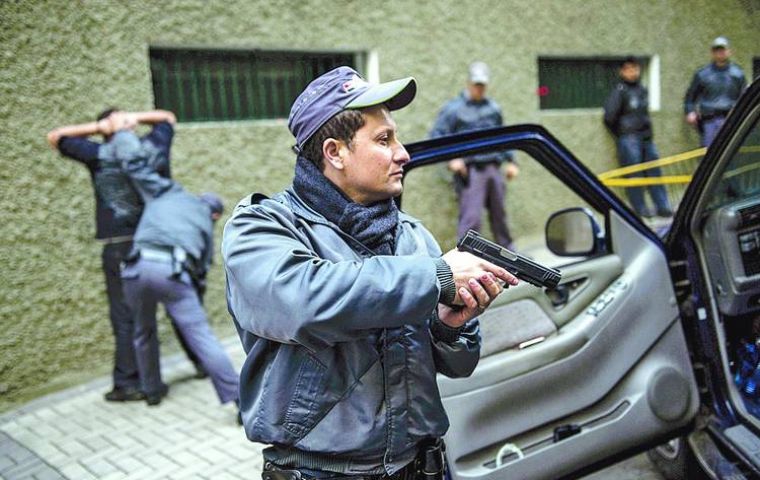MercoPress. South Atlantic News Agency
Sao Paulo turned into a shoot out battle ground between drug lords and the police
 Killings and executions in Sao Paulo streets, a common scene
Killings and executions in Sao Paulo streets, a common scene The wave of killings in South America’s largest city, Sao Paulo is attributed to a resurgence of attacks from the criminal gang PCC (First Command of the Capital) against the police, which is also involved in reprisals turning the Brazilian metropolis into one of the most violent in the country.
“We see this as a revenge process executed by organized crime” against the police said Ignacio Cano, head researcher of the Violence Analysis Lab from the University of the Rio do Janeiro state.
“There have been police operations with many victims or an excess use of force, supported by public officials” to which organized crime has responded, said the expert.
But there are other opinions. “The PCC is sending a political message to the new government: back off or we’ll kill more policemen” according to Julio Jacobo Waiselfisz, author of an annual publication on violence in Brazil and a researcher for the Latin American Faculty of Social Sciences.
“There’s an open war between this group and the state. The population is frightened” he added. Fernando Haddad, a candidate for Rousseff’s ruling Workers’ Party, was elected mayor of Sao Paulo on Oct. 28.
In September the official number of homicides in Sao Paulo soared to 144, more than double a year ago. Officials will only make public October’s stats at the end of November, but the media is anticipating the number could be at least 145 which represent an 86% increase over a year ago. Dozens more have been killed this month, over 30 only last weekend.
Since the beginning of the year a hundred members of the police have been the target of criminal gangs, with forty of them clearly plain executions. A list with names, physical descriptions and addresses of police officers found during a raid in one of the favelas (slums which surround all major Brazilian cities) is considered a clear signal that the current violence wave is focused mainly in killing law enforcement officers.
“I believe the PCC is responsible for the attacks against the military police” said Camila Dias, an expert from the Violence Study Nucleus from the University of Sao Paulo, “but some groups inside the police are also involved in reprisal attacks and executions”.
Relatives from civilians killed insist that the military police is involved in indiscriminate killings to revenge their comrades executed. A woman solicitor suspected of being close to the PCC was shot to death over the weekend while at a gas station, reported the Brazilian media.
The attacks and executions recall the violent month of May 2006 when a wave of killings, jail uprisings and street barricades attributed to the PCC, which operates from the inside the prisons’ system left over 170 people killed, 47 of them police officers, leaving Sao Paulo during a week paralyzed and at the mercy of the shootouts and arson of government property and the transport system.
PCC was created in 1993 at the Taubaré prison, close to Sao Paulo. Nowadays it operates from inside and outside the Sao Paulo prisons’ system and is involved in drug trafficking, killing of police and local officers that they can’t bribe and other crimes.
The Brazilian media says the PCC gang has 1.300 members while Sao Paulo authorities limit it to “no more than forty”. A recent report signed by twelve Sao Paulo prosecutors claims the prisons’ system of the state is in the “hands of PCC”.
President Dilma Rousseff’s administration last week pledged additional federal aid, including increased intelligence and drug-combating operations, as well as heightened police controls at access points to Sao Paulo, as schools and stores were forced to close in some of the city’s northern neighborhoods because of violence.
The homicide rate in Sao Paulo state had fallen to 10.1 per 100,000 inhabitants last year from 35.3 per 100,000 in 1999, according to the website of the state’s public security secretary. However this year through September, murders in Sao Paulo have risen to 3,536 from 3,225.
Brazil remains one of the world’s most-violent counties with an average homicide rate over the past decade that has remained little changed at 26 per 100,000 inhabitants.




Top Comments
Disclaimer & comment rules-

-

-

Read all commentsSao Paulo's murder rate has been statistically much lower than one might expect.
Nov 14th, 2012 - 12:19 pm 0It is getting back to levels more in line with the rest of Brasil's cities.
It may be simple coincidence that its rise accompanies Fernando Haddad's commencement of term of office.
This could be manipulated by any involved Party (if you believe in conspiracy theory),
or it may be just the killing off of the non-malleable police, the take over of the compliant police, and the prisons .. and the legal system .. by the 'drug dealers'.
#1 Are you suggesting Haddad is not only murdering people, but killing so many it changes the overall statistical trend?
Nov 14th, 2012 - 10:47 pm 0Are you using a messenger such as Skype, Whatsapp, ooVoo etc.? Participate in a survey and win iPad (mini)! This is not spam – you can contact us directly: Gleb Zhukov at gleb.zhukov@axience.com.
Nov 21st, 2012 - 11:46 am 0Please follow the link to sign-up for the survey: https://www.surveymonkey.com/s/5KC7T33
Commenting for this story is now closed.
If you have a Facebook account, become a fan and comment on our Facebook Page!